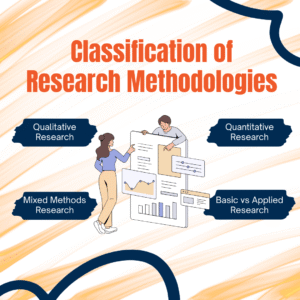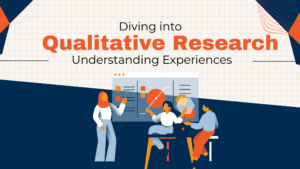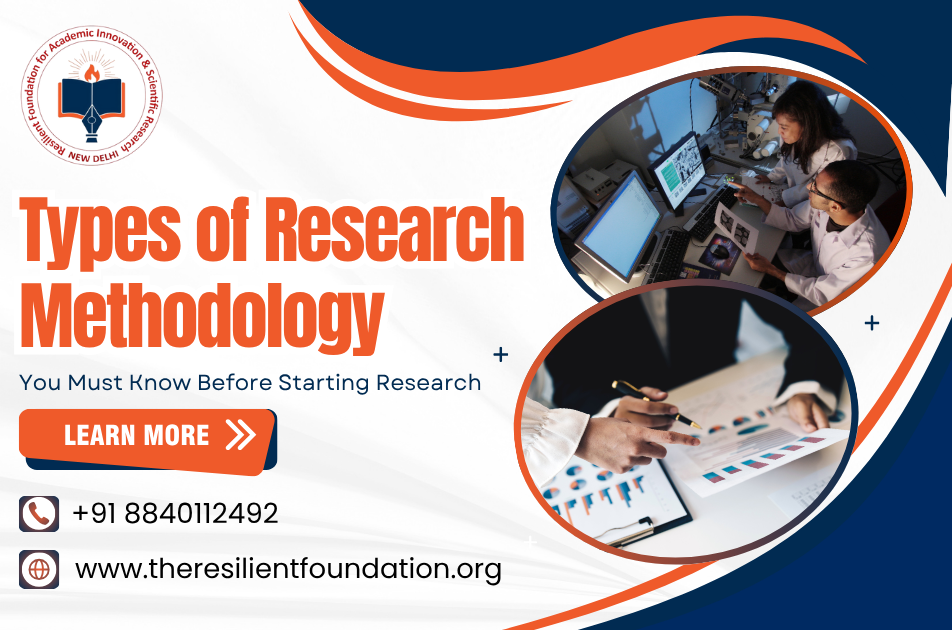Before you start your journey into scientific research, it’s very important to understand the different types of research methodology. Each method has a purpose and fits different kinds of studies. But your research may go wrong if you don’t know which one to choose. Because of that, having a clear idea of the right types of research methodology helps you stay focused, ask the right questions, and collect better data. Whether you are studying social science or looking at research methods in education, choosing the right path is the first big step.
Classification of Research Methodologies
Research methodologies are often grouped based on how they are used. So, before choosing a method, you must understand these basic types:

- Qualitative Research: Focuses on words, emotions, and human experiences. It’s useful when the aim is to understand why or how something happens. This falls under research methods in education when studying student behaviour or teaching style.
- Quantitative Research: Deals with numbers and data. It helps you test theories and make predictions. This is a strong part of scientific research.
- Mixed Methods Research: Combines both qualitative and quantitative approaches. It gives a fuller view of the subject. Because of this, many modern studies use mixed methods research for better results.
- Basic vs Applied Research: Basic research builds general knowledge, while applied research solves real-world problems. So, choose what suits your study best.
Each category plays a role in shaping your research. If you are confused, The Resilient Foundation offers easy-to-understand online workshops that help you select the right types of research methodology for your project.
Diving into Qualitative Research: Understanding Experiences
Qualitative research focuses on exploring feelings, experiences, and meanings. It’s useful in areas like psychology, education, and social work. Here are some common types:

- Interviews: These help gather deep insights from individuals. You can understand personal stories using this research methodology.
- Focus Groups: Talking with small groups gives a better idea of shared views or cultural behaviour.
- Observation: Watching behaviour in natural settings is a key part of scientific research, especially in early childhood education.
- Case Studies: These are detailed studies of a single subject or small group over time.
In research methods in education, these tools help teachers understand how students learn. Yet, qualitative data is harder to measure. Thus, it’s often combined with other methods like mixed methods research for balanced results.
Exploring Quantitative Research: The Power of Numbers
When your goal is to find patterns or prove a theory using data, quantitative research is the way to go. It focuses on numbers and statistics. Some important types of research methodology under this include:
- Surveys and Questionnaires: These collect answers from a large number of people. They help in understanding trends.
- Experiments: These allow researchers to test causes and effects in a controlled way. This is very useful in scientific research.
- Statistical Analysis: Helps in concluding the data collected.
- Content Analysis: Breaks down written or recorded materials to count words or phrases.
Combining Approaches: Mixed Methods Research
Sometimes one approach is not enough. That’s when mixed methods research works best. It blends both words and numbers to give a complete picture. This research methodology helps researchers get the best of both worlds. Common ways to mix methods are:
- Sequential: Start with one method and follow up with another. For example, do a survey first and then interview a few participants.
- Concurrent: Do both qualitative and quantitative work at the same time.
- Transformative: Use both methods with a focus on a specific value or cause. This is often used in education or community-based scientific research.
Because of this mix, your findings are richer and more reliable. It also helps when studying complex issues in research methods in education. But using two methods means double the work, so plan wisely. The Resilient Foundation’s expert-led programs train you on how to carry out mixed methods research without stress.
Finalising Your Research Plan: Key Takeaways
Once you know the types of research methodology, the next step is to choose the one that matches your topic. But how can you be sure? Here are some easy tips to follow:
- Think About Your Research Question: The question helps you decide if you need stories, numbers, or both. This helps you choose the best research methodology.
- Know Your Goals: If your goal is to understand behaviour, go with qualitative. If you want facts and figures, use quantitative. If you want both, go with mixed methods research.
- Check Time and Resources: If you have less time, simple surveys may help. But if you have more support, then you can try advanced methods.
- Follow Ethics: Always respect the people in your research. This is a must in scientific research and research methods in education.
- Keep Improving: Research tools keep changing. So, keep learning new ways to improve your research methodology.
At Resilient Foundation, we help you at every step. Whether you are a student, teacher, or new researcher, our programs make it easy to learn research methods in education, scientific research, or mixed methods research. Join our online workshops and training today to start your research journey with confidence!

